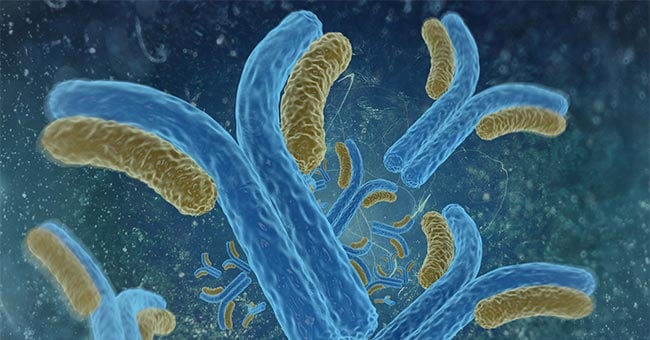Immunogenicity is determined by:
A. Properties of Immunogen
Interesting Science Videos
Foreignness
An antigen must be a foreign substance to the animal or recognized as non-self by the biological system to elicit an immune response. E.g. Bovine serum albumin, a common experiment antigen is not immunogenic when injected to the cow but strongly immunogenic when injected to the rabbit. However there are some exceptions, some macromolecules such as collagen and cytochrome c have been conserved during evolution hence are weakly immunogenic but some self-components like sperm and corneal tissues are sequestered from immune system hence are strongly immunogenic even when injected to the animal from which they are originated.
Molecular Size
The most active immunogens tend to have a molecular mass of 14,000 to 6, 00,000 Da, usually >1, 00,000 Da. g. tetanus toxoid, egg albumin, thyroglobulin are highly antigenic. Generally, substances with molecular mass less than 5,000 to 10,000 Da are poor immunogens. E.g. Insulin (5,700 Da) is either non-antigenic or weakly antigenic.
Chemical Nature and Heterogeneity
Antigens are mainly proteins and some are polysaccharides. In general, chemically more complex the substance is the more immunogenic it will be. Synthetic homopolymers (Multiple copies of single sugar or amino acids) tends to lack immunogenicity regardless of size while heteropolymers are usually more immunogenic than homopolymers. It is presumed that presence of an aromatic radical is essential for rigidity and antigenicity of a substance.
Physical form
In general particulate antigens are more immunogenic than soluble ones. Denatured antigens are more immunogenic than the native form. Large, insoluble or aggregated molecules are more immunogenic than small, soluble ones.
Susceptibility to antigen processing and presentation
Development of immune response (Both humoral and cell-mediated) requires interaction of T-cells and antigen that has been processed and presented together with MHC molecules. Antigens that cannot be processed and presented by MHC are poor immunogens. Antigens that are easily phagocytosed are generally more immunogenic. E.g. D-amino acids are stereoisomers of naturally occurring L-amino acids. As antigen-presenting cells can only process and present L-amino acids, D-amino are poor immunogens.

B. Biological System of Host
- Genotype of Recipient Animal: It is a major factor that determines immune responsiveness. Some substances are immunogenic in one species but not in another .Similarly, some substances are immunogenic in one individual but not in others. MHC gene products which function in processing and presenting of antigen influence response towards antigen. Genes that codes B-cell and T-cell receptor also influences immunogenicity. Also, the genes coding proteins for various regulatory mechanisms influences it.
- Dosage and Route of administration: An insufficient dosage of immunogen will not elicit immune response (Either it fails to elicit immune response or lead to state of tolerance). Conversely, excessively high dose will also lead to unresponsiveness or tolerance. There is a dose of antigen above or below which the immune response will not be optimal. A single experimental dosage is not sufficient to develop immune response however booster dose over a period of time enhances immunogenicity. Administration route strongly influence immune response. Sub-cutaneous route is better than the intravenous or intragastric routes.
- Adjuvants: These are substances that when mixed and injected with antigen enhances the immunogenicity of antigen. E.g. Aluminium potassium sulphate (Alum) is an adjuvant that enhances immunogenicity by increasing persistence of antigen (Releasing antigen slowly from injection site) and enhancing phagocytosis of antigen. Adjuvants enhance immunogenicity by:
- Prolonged persistence of antigen.
- Co-stimulatory signals are prolonged.
- Local inflammatory response is increased.
- Non-specific proliferation of lymphocytes is increased.
The use of adjuvants, however, is often hampered by undesirable side effects such as fever and inflammation.
